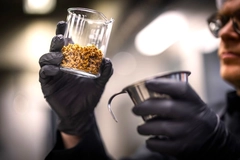
- Industry news
Industry news
- Category news
Category news
- Reports
- Key trends
- Multimedia
- Journal
- Events
- Suppliers
- Home
- Industry news
Industry news
- Category news
Category news
- Reports
- Key trends
- Multimedia
- Events
- Suppliers

21 May 2014 --- The top ten global food and drink companies combined emit more greenhouse gases than all of the Nordic nations put together, according to a new report by Oxfam. The charity also noted that the companies would rank as the 25th most polluting country in the world if grouped together.
The companies involved are Associated British Foods (ABF), Coca-Cola, Danone, General Mills, Kellogg’s, Mars, Mondelez International, Nestle, PepsiCo and Unilever.
The report, entitled ‘Standing on the Sidelines’, part of its ‘Behind the Brands’ campaign, stated that these ten companies emit more than Finland, Sweden, Denmark, Norway and Iceland’s annual total of 250m tonnes of greenhouse gases, according to its analysis of the Carbon Disclosure Project for company emissions and the most recent data for country emissions.

In the report Oxfam said it is calling on the Big 10 to face up to the scale of greenhouse gas emissions produced through their supply chains, and address the deforestation and unsustainable land-use practices they allow to happen. “They have a duty to step off the sidelines and use their influence to call for urgent climate action from other industries and governments,” it said. It also noted they should be capable of cutting their combined emissions by a further 80 million tonnes by 2020.
Kellogg’s and General Mills were highlighted by Oxfam in its report as the two worst offenders on climate change policies. The charity is urging these two, and others, to set targets to cut emissions from their supply chains. Also within the report, Unilever, Coca-Cola and Nestle were mentioned as being relatively more assertive in their policies and actions to tackle climate change, though “they still had a lot of room for improvement”.
“Too many of today’s food and beverage giants are crossing their fingers and hoping that climate change won’t disrupt the food system, imagining someone else will fix it,” said Oxfam’s executive director, Winnie Byanyima. “’The Big 10’ companies generate over $1 billion a day and have great power to influence global food chains.”
Oxfam noted that PepsiCo UK has committed to reduce emissions from its agricultural supply chain by 50% in five years. “If this commitment were replicated across the Big 10, their emissions would fall by approximately 80 million tonnes compared to business as usual by 2020,” the charity said.
In a statement Kellogg’s said it is committed to doing what is right for the environment and society. “As part of this commitment, we are working to reduce greenhouse gas emissions – along with energy use and water use – by 15 to 20% at our manufacturing facilities by 2015.”
General Mills also stated it is actively engaged in positively influencing climate policy and has been taking steps to reduce emissions.
Unilever issued a call for all companies affected by the growing costs of climate change, and in particular the food industry, to step up their commitment to tackling the issue. The risk to the food industry from climate change is severe, with some analysts predicting that the external environmental costs of climate change could exceed the earnings of the entire food industry by 2030 unless action is taken. The call coincides with a report released by Oxfam International today arguing that the ‘Top 10’ food companies, including Unilever, should be among those leading the charge to address climate change both in their own operations, in their supply chains, and in the wider public policy arena.
Miguel Veiga-Pestana, Vice President Sustainability Strategy and Global Advocacy comments, “Unilever has been at the forefront of industry efforts to tackle climate change since the mid 1990s. We were the first to establish the Unilever Sustainable Agriculture Programme to address carbon emissions from agriculture and deforestation, and more recently we were the first to launch a comprehensive plan with time-bound targets reported on annually to drive progress towards sustainable sourcing. The Unilever Sustainable Living Plan was launched in November 2010. We are currently ahead of our self imposed target on sustainable sourcing and broader CO2 emissions from energy in our operations – down by 32% since 2008.”
Unilever has also sought to improve its footprint along the full breadth of the value chain, and to play a catalytic role within the industry and the wider private sector.
For example:
Committing to sourcing 100% of agricultural raw materials sustainably by 2020, including tropical commodities, such as palm, soy and the paper and board used in its packaging.
Working with the United Nations Environment Programme and Greenpeace to eliminate highly damaging HFCs from commercial refrigeration.
Actively contributing to the work of HRH The Prince of Wales’ Corporate Leaders Group on Climate Change, which has made the case for progressive public policy to bring down emissions and accelerate the deployment of renewable energy.
Sourcing 100% renewable electricity for sites in Europe and North America.
Co-Chairing the Sustainability Committee of the Global Consumer Goods Forum (CGF), an industry group with combined turnover of $3 trillion, with specific programmes now in place on deforestation and refrigeration.
Unilever also led the process which resulted in the creation of the Tropical Forest Alliance (TFA) a public-private partnership between the 400 companies of the CGF, the governments of the USA, UK, Norway, the Netherlands, Indonesia and Liberia and a large number of international NGOs. The principal goal of the TFA is to eliminate any trace of deforestation from the supply chains of consumer goods companies.
By Sonya Hook












